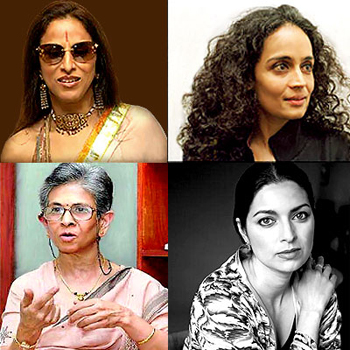 Feminism in Indian English novels, as commonly conceived, is a very sublime and over-the-top concept, which is most subtly handled under restricted circumstances. However, with development of time, feminism has been established in India, setting aside the patriarchal predomination to certain extent. Leaving aside the crusaders and activists of the social and political scenario, perhaps enormous body of work on feminism is also accomplished through Indian English literature. But, prior to realizing a closer look into feminist literature in India, it is essential to understand the crucial concept of the term `feminism` in the context of India, beginning from its inception. The history of feminism in India can be looked at as principally a "practical effort." Feminist writers in India today proudly uphold their cause of `womanhood`, through their write-ups.
Feminism in Indian English novels, as commonly conceived, is a very sublime and over-the-top concept, which is most subtly handled under restricted circumstances. However, with development of time, feminism has been established in India, setting aside the patriarchal predomination to certain extent. Leaving aside the crusaders and activists of the social and political scenario, perhaps enormous body of work on feminism is also accomplished through Indian English literature. But, prior to realizing a closer look into feminist literature in India, it is essential to understand the crucial concept of the term `feminism` in the context of India, beginning from its inception. The history of feminism in India can be looked at as principally a "practical effort." Feminist writers in India today proudly uphold their cause of `womanhood`, through their write-ups.
Feminism in Indian English novels is not at all a new-fangled concept and over the years many new writers who have broken into the literary circuit and have successfully created a reader base. Indian women writers, composing their thoughts in English range from an array of people like Toru Dutt to Kamala Das and from Sarojini Naidu to Suniti Namjoshi, Arundhati Roy to Shahsi Deshpande. These female Indian writers tell the astonishing variety of theme, in a style, that poetry and novels are capable of offering. After absorbing a variety of influences in the last fifty years, after dealing with an array of themes and thoughts, a diverse striates of poetic and literary expressions had been created. Each writer, in their own way, has tried to convey their thoughts in a distinct personal voice, yet they have been successful in forming a part of the chorus, a collective tone emphasizing the sovereignty of women. It must be kept in mind that literary creation by women need not be conceived only as feminist creation. Women writers have often raised their voice against social and cultural principles that constrained their liberty and perpetrated institutional seclusion of women. In most cases the write ups are written in a confessional and personal note, where their composition acts as a social document as they are themselves sufferers and also agents of social revolution.
In the contemporary scenario there are many women writers who, through their writings, have been successful in projecting the existing social inequality. With regards to the new-fangled styles, technique and trends in women`s novels and poetry there is a noteworthy movement linking the domestic with the public spheres of work. Improved metropolitan involvement, sophisticated and posh life styles, standardization, globalization, urbanized influences of disco, caf, and pop culture, Anglo-Americanization and increased preference for convent education of the present generation of women poets have made their literary narratives sharper, chiselled, effortless and pithy. Breaking the norms of popular trends in literary narrative, the women writers, along with the simultaneous assimilation of Pan-Indian elements, have made their creativity a formidable area of study and research.
The history of Indian English novel, a journey which began long back has witnessed a lot of alteration to gain today`s chic contour. In the past few years many prominent writers have made a mark on the Indian Diaspora. Eminent writers like Arundhati Roy, Jhumpa Lahiri, Shobha De, etc. have given Indian English novel a whole new level. The novels include various concepts of fact and fiction and are based on current events and recent social problems.
Women writers explore old wives` tales, condemn exploitation and try to make sense of the fast changing pace of the new world. Kamala Das explores women`s plight in India and the world and others like Shashi Deshpande paint characters who blame their own complacence for their remorseful condition. Arundhati Roy begins her story without a beginning and does not really end it while Jhumpa Lahiri`s well-crafted tales move at a perfect pace.
Shashi Deshpande is one of the serious novelists around who is never after gimmicks. There is an honest voice, very severe about the story being told and its style. She is one of the rare writers with little posturing. Her novels usually have women as th protagonists. This has led readers to call her a feminist writer.
Shashi Deshpande is of the view that in calling her novels feminist, one straitjackets the works; imprisons them with the label. She feels that while she is feminist, her novels are novels. She hasn`t written the novels as a debating voice, to develop a thesis in a debate. She feels her novels are open examinations of the experiences of people in specific setting.
In case of Arundhati Roy, who has her own opinion on society and has successfully made a mark for herself in the world arena. In the novel, The God of Small Things, which also won a Booker Prize in 1998, the processes of subjugation and suppression mechanisms clearly portrayed through a variety of narrative techniques: characterisation, scenes of violence, ironic juxtapositions, small acts of defiance by characters, etc. Apart from these aesthetic codes, the historical and polemical codes in the novel too function as a direct and indirect commentary on the will to power of the `Big Gods`.













